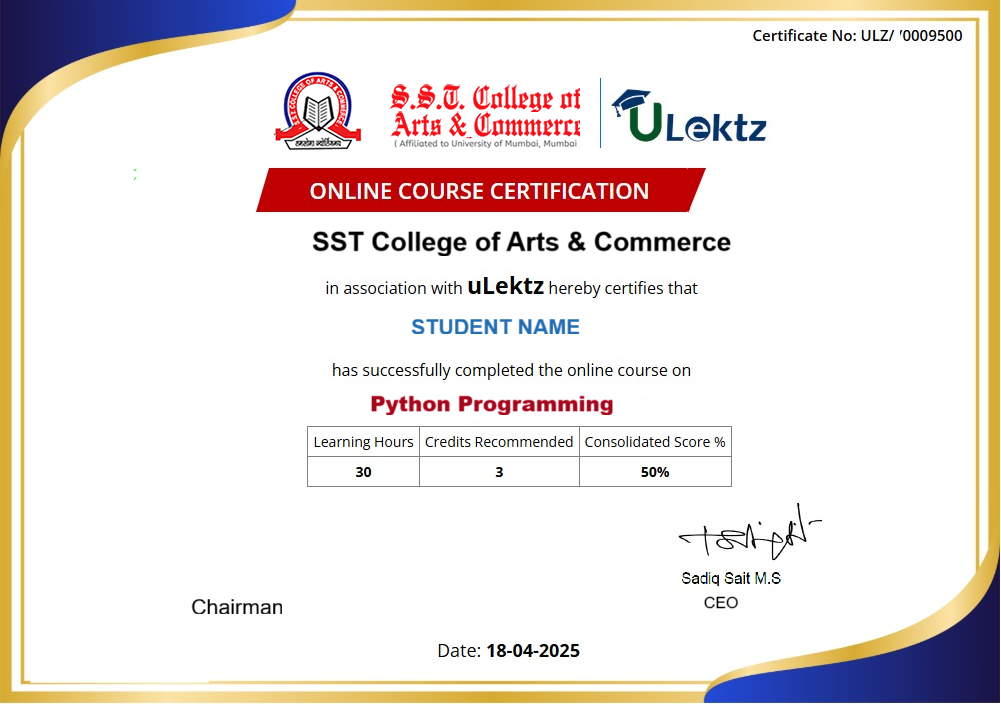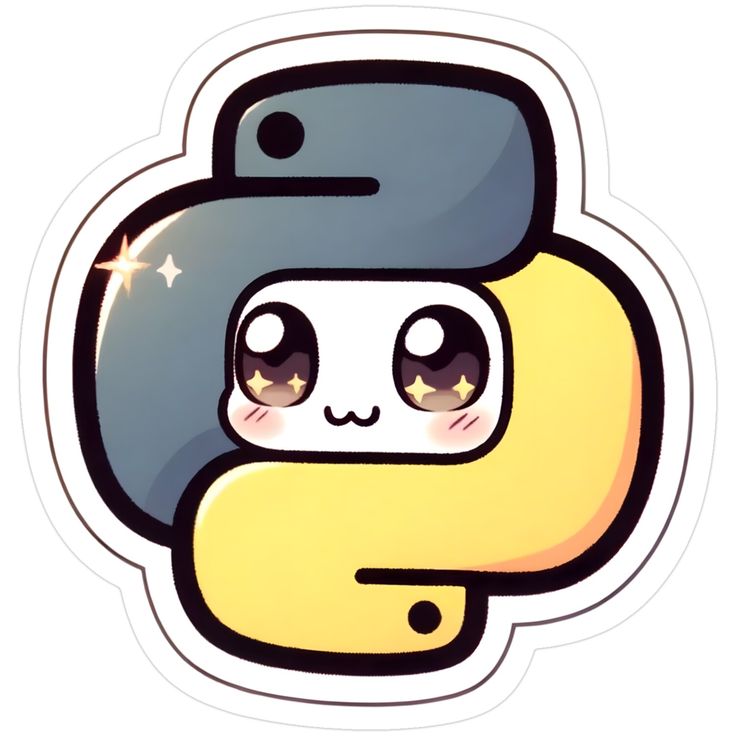

Note: Please check your Spam or Junk folder, in case you didn't receive the email with verification code.
Non-Linear: Random Order
Course Objectives
1. Provide a thorough understanding of full-stack web development using Python as the backend foundation.
2. Equip learners with expertise in Python frameworks (Django/Flask), frontend technologies, and database management.
3. Enable learners to design, build, and deploy scalable web applications.
4. Enhance employability with practical project experience, DevOps practices, and portfolio development.
5. Bridge the gap between academic knowledge and industry requirements in India.
Learning Outcomes
Upon successful completion, learners will:
1. Build, deploy, and maintain full-stack web applications using Python.
2. Develop dynamic front-end interfaces with HTML, CSS, JavaScript, and modern libraries like React.js.
3. Implement RESTful APIs using Flask or Django frameworks.
4. Design and query relational and non-relational databases.
5. Utilize DevOps practices for deployment and application monitoring.
Showcase their skills through a professional portfolio and capstone project
. Overview of Full Stack Development.
Overview of Full Stack Development.
 Understanding Python as the foundation for backend development.
Understanding Python as the foundation for backend development.
 Setting up the development environment (PyCharm, VS Code, virtual environments)
Setting up the development environment (PyCharm, VS Code, virtual environments)
 Python programming basics: Syntax, data types, and control structures
Python programming basics: Syntax, data types, and control structures
 Ref: Python
Duration:
Ref: Python
Duration:
 Unit 1 Test
10 Questions
Unit 1 Test
10 Questions
 HTML5, CSS3, and JavaScript fundamentals.
HTML5, CSS3, and JavaScript fundamentals.
 Responsive design with CSS frameworks (Bootstrap, TailwindCSS).
Responsive design with CSS frameworks (Bootstrap, TailwindCSS).
 JavaScript ES6+ features (arrow functions, promises, async/await)
JavaScript ES6+ features (arrow functions, promises, async/await)
 DOM manipulation and event handling
DOM manipulation and event handling
 Ref: Responsive CSS frameworks
Duration:
Ref: Responsive CSS frameworks
Duration:
 Unit 2 Test
10 Questions
Unit 2 Test
10 Questions
 Introduction to React.js or Angular for dynamic UIs.
Introduction to React.js or Angular for dynamic UIs.
 Component-based architecture, Props, and State.
Component-based architecture, Props, and State.
 Routing with React Router or Angular Router.
Routing with React Router or Angular Router.
 State management with Redux or Context API.
State management with Redux or Context API.
 API integration and error handling in React/Angular
API integration and error handling in React/Angular
 Ref: Redux API
Duration:
Ref: Redux API
Duration:
 Unit3 Test
10 Questions
Unit3 Test
10 Questions
 Introduction to Flask and Django: What and Why
Introduction to Flask and Django: What and Why
 Setting up a Flask/Django project
Setting up a Flask/Django project
 URL routing and views.
URL routing and views.
 Templating engines (Jinja2 for Flask, Django Templates).
Templating engines (Jinja2 for Flask, Django Templates).
 Building RESTful APIs with Flask/Django REST Framework (DRF)
Building RESTful APIs with Flask/Django REST Framework (DRF)
 Ref: FastAPI, Flask
Duration:
Ref: FastAPI, Flask
Duration:
 Unit4 Test
10 Questions
Unit4 Test
10 Questions
 Relational databases: PostgreSQL/MySQL.
Relational databases: PostgreSQL/MySQL.
 Introduction to NoSQL databases (MongoDB).
Introduction to NoSQL databases (MongoDB).
 Writing SQL queries and database normalization.
Writing SQL queries and database normalization.
 Using ORMs (SQLAlchemy for Flask, Django ORM for Django).
Using ORMs (SQLAlchemy for Flask, Django ORM for Django).
 Database security, indexing, and performance optimization.
Database security, indexing, and performance optimization.
 Database management
Duration:
Database management
Duration:
 Unit 5 Test
10 Questions
Unit 5 Test
10 Questions
 User authentication with Flask/Django.
User authentication with Flask/Django.
 Handling sessions and cookies.
Handling sessions and cookies.
 JWT-based authentication.
JWT-based authentication.
 Implementing OAuth for third-party logins (Google, Facebook, etc.).
Implementing OAuth for third-party logins (Google, Facebook, etc.).
 Ref: OAuth 2.0
Duration:
Ref: OAuth 2.0
Duration:
 Unit6 Test
10 Questions
Unit6 Test
10 Questions
 Connecting the front-end with Flask/Django APIs
Connecting the front-end with Flask/Django APIs
 Building RESTful and GraphQL APIs.
Building RESTful and GraphQL APIs.
 Real-time communication using WebSockets.
Real-time communication using WebSockets.
 Deployment on Heroku, AWS, or Vercel
Deployment on Heroku, AWS, or Vercel
 Configuring CI/CD pipelines for automated deployments
Configuring CI/CD pipelines for automated deployments
 Ref: Integration and deployment
Duration:
Ref: Integration and deployment
Duration:
 Unit 7 Test
10 Questions
Unit 7 Test
10 Questions
 Writing unit tests with pytest or unittest.
Writing unit tests with pytest or unittest.
 Testing APIs with Postman
Testing APIs with Postman
 Debugging techniques for frontend and backend
Debugging techniques for frontend and backend
 End-to-end testing with Selenium or Cypress
End-to-end testing with Selenium or Cypress
 Automated testing in CI/CD workflows.
Automated testing in CI/CD workflows.
 Ref: Debugging
Duration:
Ref: Debugging
Duration:
 Unit8 Test
10 Questions
Unit8 Test
10 Questions
 Communication and collaboration in development teams
Communication and collaboration in development teams
 Preparing a professional resume and LinkedIn profile
Preparing a professional resume and LinkedIn profile
 Creating a developer portfolio showcasing projects
Creating a developer portfolio showcasing projects
 Interview preparation: Technical questions and problem-solving.
Interview preparation: Technical questions and problem-solving.
 Effective presentation skills for technical demos.
Effective presentation skills for technical demos.
 Networking and leveraging job opportunities in the Indian IT market.
Networking and leveraging job opportunities in the Indian IT market.
 Ref: Job ready portfolio
Duration:
Ref: Job ready portfolio
Duration:
 Unit9 Test
10 Questions
Unit9 Test
10 Questions
 Final Assessment
30 Questions
Final Assessment
30 Questions
The certificate issued for the Course will have
Only the e-certificate will be made available. No Hard copies. The certificates issued by SST College of Arts and Commerce Mumbai. can be e-verifiable at www.ulektzskills.com/verify.



 60 hours Learning Content
60 hours Learning Content 100% online Courses
100% online Courses English Language
English Language Certifications
Certifications